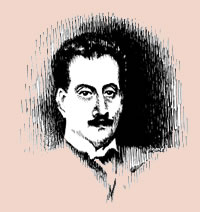
GIACOMO PUCCINI
The theatre was filled with bird calls and obscenities so loud that long passages of music were totally inaudible. The final curtain fell to whistles and laughter. This was February 17, 1904 in Milan, Italy, the premiere of Giacomo Puccini's Madame Butterfly. The opening night proved to be one of the greatest disasters in the history of opera.
Various explanations were given for the fiasco, but Puccini still believed in his work, as expressed to a friend in a letter:
You will be horrified by the vile words of the envious press. Never fear! Butterfly is alive and real, and will soon rise again. I say it and believe it with unalterable faith -- you will see...*
Indeed, only three months later, with revisions, Madame Butterfly was performed at Brescia, Italy. It was a triumph, and has remained a favorite, beloved opera to this day.
The Puccini family had come to the Italian city of Lucca in the early 18th century. Its members held honored positions as composers, cathedral organists, and choirmasters for nearly 150 years. To this long line of musicians came the fifth generation, Giacomo Puccini, born on December 22, 1858.
Giacomo Puccini was only five years old when his father died suddenly at the age of fifty-one. His wife, Albina Magi, then thirty-three and pregnant with their seventh child, was left widowed to bring up their young family on a pension of only 75 lire a month ($15 then).
Albina Magi expected her oldest son, Giacomo, to assume the traditional family position in the post of cathedral organist and choirmaster, but it was doubtful that Giacomo would ever be ready to fill the positions his predecessors held. He was not a good student. He preferred to skip school and hunt birds, smoke cigarettes and play pranks. He was sent to study music with his uncle Fortunato Magi at the Istituto Musicale. His uncle soon gave up on his nephew whom he believed did not have the necessary talent and discipline to attend music school.
Puccini's mother, however, had not given up on her son and begged for the assistance of another teacher. This teacher was more patient with Puccini and spurred the development of his musical talent. Soon Puccini was contributing part of the salary he earned as an organist to the family's meager income.
On March 11, 1876, Giuseppe Verdi's opera masterpiece Aida was being performed in Pisa, a town twenty miles from Lucca. Puccini was determined to see this performance but did not have money for train fare to Pisa. He ran the three hours' distance and managed to "talk" his way into the theatre. The performance changed Puccini's life. He was committed to becoming an operatic composer.
Puccini resolved to be admitted to the Conservatory in Milan, the operatic capital of northern Italy. Since he was unable to obtain a scholarship on achievement, Puccini's mother appealed to Queen Margherita who awarded scholarships to talented students of poor families. The Queen awarded Puccini a royal scholarship to the Conservatory.
While at the Milan Conservatory, Puccini was fortunate to become a protégéof teacher and composer Amilcare Ponchielli. Through him, Puccini made two important acquaintances that would change his career.
The first was Giulio Ricordi, head of Europe's most influential music publishing company, who became a father figure and mentor to Puccini. Ponchielli also introduced Puccini to Ferdinando Fontana who became Puccini's first librettist and with whom Puccini created his first opera -- Le Ville. This opera was originally written for a competition, but was rejected. Puccini and Fontana did not abandon the work. With revisions and funding, the opera was produced in 1884. It was so successful that Ricordi purchased the rights to it and commissioned another opera.
Puccini worked slowly and usually spent three to four years working on an opera. During the years that he was working on his second opera, Edgar, Puccini again experienced the struggle of poverty, only to be disappointed by the opera's failure in 1889.
Puccini's first notable success came with his third opera, Manon Lescaut, which was soon produced throughout Europe. The universal fame that he received from La Bohème and Tosca gained him the reputation as Verdi's successor.
Just before the premiere of Madame Butterfly in 1904, Puccini married Elvira Gemignani, legitimizing their eighteen-year-old son Antonio. Puccini's later operas include The Girl of the Golden West, La Rondine, and Il Trittico. Puccini did not live to complete his last work, Turandot. He died on November 29, 1924, not quite 66 years old, of a heart attack following an operation for throat cancer caused by incessant smoking. Turandot was completed by Italian composer Franco Alfano and performed in 1926.
Giacomo Puccini struggled to earn the honor of becoming one of the world's great opera composers. With the death of Puccini, many felt that the line of Italian composers had come to an end.
* Adami, Giuseppe. LETTERS OF GIACOMO PUCCINI. Vienna House. 1973.

